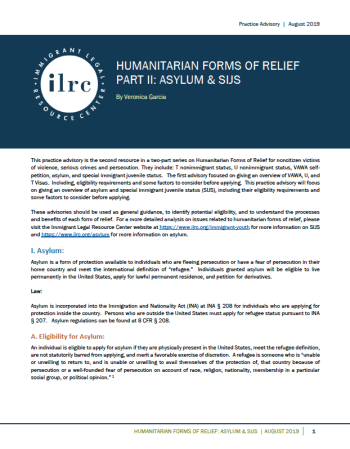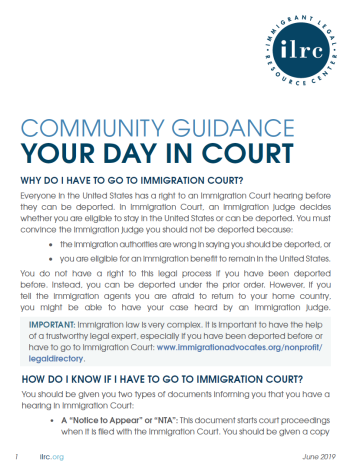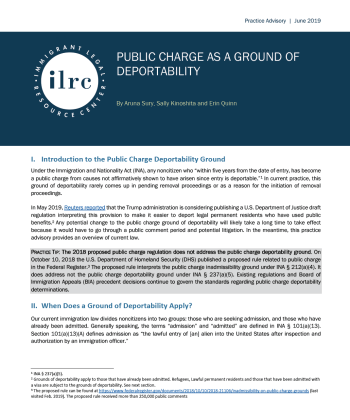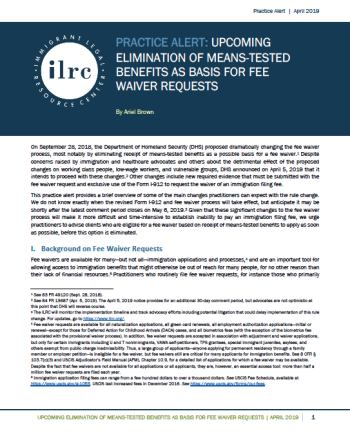Term Page
Asylum Path Fragment
community
On August 26, 2019, the Department of Justice, Executive Office for Immigration Review (EOIR) published an interim final rule, effective immediately, with a request for public comments by October 25, 2019. ILRC posted a templated comment urging programs to send in their own responses.
The Immigrant Legal Resource Center created this template to help you draft your own comments in opposition to this interim rule with request for comment. The new rule can be found here. Comments are due by October 25, 2019. We are very concerned about this rule’s “reorganization” at EOIR that eliminates OLAP, the office that has operated the Recognition and Accreditation (R & A) Program and the legal orientation programs until now. The rule places the remaining functions of OLAP under an Office of Policy.

This practice advisory is the second resource in a two-part series on Humanitarian Forms of Relief for noncitizen victims of violence, serious crimes and persecution. They include: T nonimmigrant status, U nonimmigrant status, VAWA self-petition, asylum, and special immigrant juvenile status. The first advisory focused on giving an overview of VAWA, U, and T Visas. Including, eligibility requirements and some factors to consider before applying. This practice advisory will focus on giving an overview of asylum and special immigrant juvenile status (SIJS), including their eligibility requirements and some factors to consider before applying.

This community resource provides a brief explanation of the Immigration Court experience. It gives an overview of what happens in Immigration Court, how to confirm information about a case in Immigration Court, and what a person in removal proceedings should do if they do not have an attorney to represent them at an upcoming hearing. This information is useful for community members and advocates working with the immigrant community.
On June 5, 2019, the Department of Homeland Security’s U.S. Citizenship and Immigration Services (USCIS) published a third notice regarding its plans to dramatically change fee waiver eligibility and process. The June 5 notice attempts to provide additional justification for its plan to eliminate means-tested benefits as a basis for requesting a fee waiver, among other changes, following April 5 and September 28 notices that lacked rationale for why such changes to fee waivers are justified. Now, USCIS is also claiming lost fee revenue as a reason for its proposed changes to fee waivers, making clear its intention to reduce the number of fee waivers that are granted. If finalized, these proposed changes will discourage eligible individuals from filing for fee waivers and immigration benefits and place heavy time and resource burdens on those who do still apply for fee waivers.

Under the Immigration and Nationality Act (INA), any noncitizen who “within five years from the date of entry, has become a public charge from causes not affirmatively shown to have arisen since entry is deportable.” In current practice, this ground of deportability rarely comes up in pending removal proceedings or as a reason for the initiation of removal proceedings.

This practice alert provides a brief overview of some of the main changes practitioners can expect with the proposed change to fee waiver eligibility and process, most significantly by eliminating receipt of means-tested benefits as a basis for requesting a fee waiver. Given that these significant changes to the fee waiver process will make it more difficult and time-intensive to establish inability to pay an immigration filing fee, we urge practitioners to advise clients who are eligible for a fee waiver based on receipt of means-tested benefits to apply as soon as possible, before this option is eliminated.
This comment period has closed. Click here respond to the latest notice of proposed fee waiver rule change.
The master calendar hearing is the first hearing in removal proceedings before an immigration judge of the Executive Office for Immigration Review, during which serious substantive decisions can be made in an immigrant’s removal case. Advocates must be well prepared and have a clear case strategy in mind prior to the master calendar hearing, as well as a detailed plan for how to advocate during this hearing. This advisory and accompanying checklist are designed to provide a quick guide for advocates to flag the issues that need to be addressed when representing clients at a master calendar hearing.
In June 2018, the U.S. Attorney General issued Matter of A-B-, 27 I&N Dec. 316 (A.G. 2018), which threatens the viability of asylum claims by domestic violence survivors and others who have faced persecution by private actors. In addition to the harmful legal rhetoric in the decision about the nature of domestic violence, Matter of A-B- also highlights the Trump administration’s broad and unrelenting attacks on due process for asylum seekers. In this practice advisory, we provide a brief summary of the AG’s decision. In addition, we note how the U.S. Citizenship and Immigration Services (USCIS) and Immigration and Customs Enforcement (ICE) guidance published in the following weeks exacerbate the issues presented by the decision. We also share several due process concerns in light of this decision and offer information about additional resources for advocates.